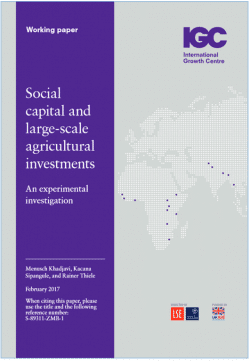
Policy highlights:
- The proximity of large scale agricultural investments (LSAIs) to surrounding smallholder settlements has a number of spill-over effects, both positive, such as by employment creation and infrastructural development, and negative – such as by displacements and increased land insecurity.
- This research focuses on spill-over effects on the social capital of smallholder settlements in Zambia, including trust, norms of reciprocity and group interactions.
- The investigation found that village communities adjust cooperative behaviour when exposed to market-oriented systems, such as those that characterize LSAIs. These findings include: 1) smallholders close to LSAIs are more trusting than those in villages further away, 2) villagers who have worked on LSAIs are more likely both to trust and to reciprocate and 3) there is greater cooperation in communities neighbouring LSAIs.







